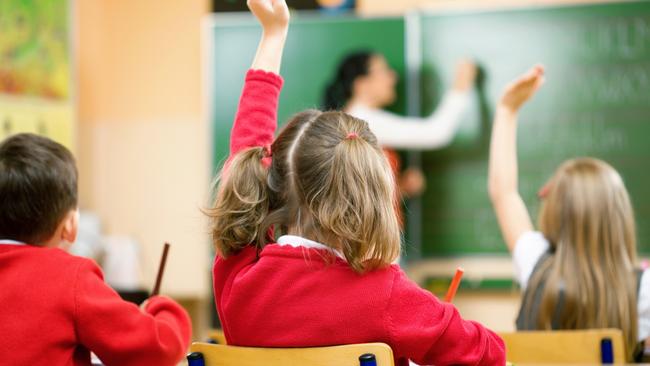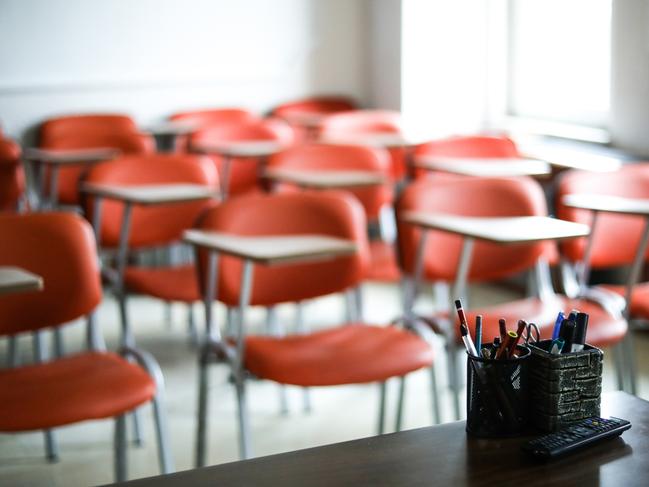Wyndham, Hume and Casey among LGAs recording most Year 7 student absences
A blend of teacher shortages, problematic behaviour, Covid and mental health are being blamed for the rising number of Victorian children missing class. See which LGAs have the most absences.

Education
Don't miss out on the headlines from Education. Followed categories will be added to My News.
Victorian student absences have skyrocketed in the past five years, with experts warning teacher shortages, poor mental health and the aftermath of Covid are to blame.
A Saturday Herald Sun analysis of year 7 absences by local government area has revealed school children missed a staggering 1,136,946 days in 2023 – up 41 per cent compared to 805,924 days off in 2019.
Academics have warned the situation will only worsen if teacher shortages, staff stress and problematic behaviour aren’t addressed.
Wyndham, in Melbourne’s west, recorded the largest number of student absences last year (76,071) – a surge of 83 per cent compared to five years ago.
This was followed by Hume in the city’s northern fringe, which saw an increase of 72 per cent in days off.
Casey (54 per cent), Ballarat (55 per cent), Knox (50 per cent), Whittlesea (47 per cent), Mornington Peninsula (43 per cent) and Greater Geelong (33 per cent) also recorded a rise in year seven students missing class.
Amid the rise in absences, there was also a slight increase in the number of students who completed Year 7, with 44,435 children enrolled in 2023, compared to 43,824 in 2019.
The data comes after the Herald Sun revealed more students were dropping out of school in Victoria than at any point in the past decade.
But a Department of Education spokesman said Victoria’s student attendance rates continued to lead the nation.
“In 2023 Victorian schools again had the best attendance of any state or territory,” he said.
“Growth in student enrolments in Casey, Wyndham and Greater Geelong over the past five years has averaged over 17 per cent, which has subsequently caused growth in the total numbers of absent days in those areas.”
Australian Catholic University Inclusive Education expert Dr Matthew White said truancy, “school can’t” and heightened vigilance against spreading illness post-covid were among the many factors prompting students to avoid the classroom.
“There has been a combination of factors that prevented young people returning,” he said.
“If we look at the education system, teacher shortages, increased staff stress and problematic behaviour have created climates in schools that prevent young people from engaging.”
Dr White said there were immediate, medium, and long-term impacts on students who struggled with school attendance.
“Immediately, missing school leads to lower academic performance, reduced literacy and numeracy skills, reduced academic self-efficacy and increased disengagement,” he said.
“In the medium term, absenteeism is linked to psychological issues such as anxiety, depression, and social isolation, as well as behavioural problems including substance use and involvement in the juvenile justice system.”
ACU educational psychology and exceptional learning professor John Munro said stress and anxiety levels as well as a lack of self-confidence and self-esteem were also driving absences.
“The attendance data are consistent with students having less confidence in their capacity to cope and to interact successfully in real life social situations,” he said.
“This includes learning in the social context of the classroom.”
Prof Munro added schools needed procedures to target gaps in students’ academic learning due to the pandemic.
“Schools need to recognise that the learning profiles of some students have changed following lockdown,” he said.

Victorian Student Representative Council chief executive Julia Baron said there was a wide range of compounding issues causing student absences.
“This includes whether schools are accessible for students, how safe they feel going to school, levels of anxiety and the impacts of their mental wellbeing,” Ms Baron said.
“It’s important for parents and schools to support students to re-engage, especially when it might require effort and outreach on the student’s behalf.”
Opposition early childhood and education spokeswoman Jess Wilson described the absence figures as “deeply concerning”, saying “no student will improve their learning outcomes by spending less time in the classroom”.
“Victoria needs a new approach to keep students engaged with their education and school community,” she said.




